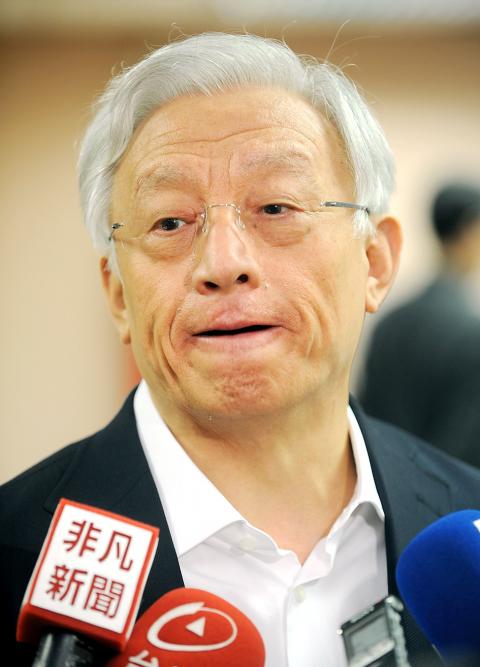Reports emerged yesterday that Robert Tsao (曹興誠), founder and former chairman of United Microelectronics Corp (UMC, 聯電), gave up his Republic of China (ROC) citizenship and obtained Singaporean nationality in January.
Tsao apparently changed his nationality because he was disgruntled over his lengthy legal tribulations brought on by the semiconductor maker’s allegedly illegal investment in a Chinese company.
Prosecutors charged Tsao in 2001 with breach of trust in violation of the Commercial Accounting Act (商業會計法) for investing in Chinese company HeJian Technology (Suzhou) Co.

Photo: Lin Cheng-kun, Taipei Times
The Taiwanese government barred local high-tech firms from interacting with Chinese companies at the time, fearing that transfers of sensitive technology would damage the country’s competitiveness and security.
After a lengthy litigation process, the Taiwan High Court found Tsao not guilty last year and prosecutors decided not to appeal the court case against the company founder.
Tsao did not answer calls yesterday and UMC would not confirm the reports that he had changed his nationality.
“It is a private issue for Tsao. We are not in a position to comment,” UMC said.
“As Tsao is no longer involved in the operations of the company, it will not affect the company’s operations,” it added.
The Ministry of the Interior said yesterday it would not comment on an individual case.
According to the Nationality Act (國籍法), ROC citizens over the age of 20 who voluntarily obtain foreign nationality will lose their ROC nationality after receiving the ministry’s approval.
Meanwhile, Vanessa Shih (史亞平), Taiwan’s representative to Singapore, denied yesterday she had witnessed a ceremony in which Tsao gave up his citizenship.
Shih reportedly witnessed the ceremony and then said privately that the fewer people who knew about the matter the better so as not to embarrass President Ma Ying-jeou (馬英九).
“I will not comment on the part regarding Mr Tsao, because it is his personal affair, but what the media report has said about me was incorrect. I have no idea what a ceremony to renounce nationality is and never attended such an event,” Shih said by telephone.
ADDITIONAL REPORTING BY SHIH HSIU-CHUAN

INVESTIGATION: The case is the latest instance of a DPP figure being implicated in an espionage network accused of allegedly leaking information to Chinese intelligence Democratic Progressive Party (DPP) member Ho Jen-chieh (何仁傑) was detained and held incommunicado yesterday on suspicion of spying for China during his tenure as assistant to then-minister of foreign affairs Joseph Wu (吳釗燮). The Taipei District Prosecutors’ Office said Ho was implicated during its investigation into alleged spying activities by former Presidential Office consultant Wu Shang-yu (吳尚雨). Prosecutors said there is reason to believe Ho breached the National Security Act (國家安全法) by leaking classified Ministry of Foreign Affairs information to Chinese intelligence. Following interrogation, prosecutors petitioned the Taipei District Court to detain Ho, citing concerns over potential collusion or tampering of evidence. The

‘FORM OF PROTEST’: The German Institute Taipei said it was ‘shocked’ to see Nazi symbolism used in connection with political aims as it condemned the incident Sung Chien-liang (宋建樑), who led efforts to recall Democratic Progressive Party (DPP) Legislator Lee Kun-cheng (李坤城), was released on bail of NT$80,000 yesterday amid an outcry over a Nazi armband he wore to questioning the night before. Sung arrived at the New Taipei City District Prosecutors’ Office for questioning in a recall petition forgery case on Tuesday night wearing a red armband bearing a swastika, carrying a copy of Adolf Hitler’s Mein Kampf and giving a Nazi salute. Sung left the building at 1:15am without the armband and apparently covering the book with a coat. This is a serious international scandal and Chinese

Seventy percent of middle and elementary schools now conduct English classes entirely in English, the Ministry of Education said, as it encourages schools nationwide to adopt this practice Minister of Education (MOE) Cheng Ying-yao (鄭英耀) is scheduled to present a report on the government’s bilingual education policy to the Legislative Yuan’s Education and Culture Committee today. The report would outline strategies aimed at expanding access to education, reducing regional disparities and improving talent cultivation. Implementation of bilingual education policies has varied across local governments, occasionally drawing public criticism. For example, some schools have required teachers of non-English subjects to pass English proficiency

TRADE: The premier pledged safeguards on ‘Made in Taiwan’ labeling, anti-dumping measures and stricter export controls to strengthen its position in trade talks Products labeled “made in Taiwan” must be genuinely made in Taiwan, Premier Cho Jung-tai (卓榮泰) said yesterday, vowing to enforce strict safeguards against “origin laundering” and initiate anti-dumping investigations to prevent China dumping its products in Taiwan. Cho made the remarks in a discussion session with representatives from industries in Kaohsiung. In response to the US government’s recent announcement of “reciprocal” tariffs on its trading partners, President William Lai (賴清德) and Cho last week began a series of consultations with industry leaders nationwide to gather feedback and address concerns. Taiwanese and US officials held a videoconference on Friday evening to discuss the